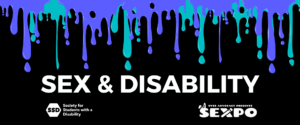Interview Series on Sex and Disability
The Sex and Disability interview series debuted at SEXPO 2023! In this interview series, we discussed how people with disabilities are sexual beings. It is often assumed that people with disabilities are not interested in sex and moreover are not interested in relationships. This is not true! We wanted to open up the conversation by having interviews with disabled folks and those who work in a variety of sex-related fields. The interviews were recorded and have been posted below for folks to watch at their own leisure.
Interviewees
Kori Doty
Kori is a queerly gendered parent, caregiver and freelance community educator based in Lekwungen territories. They have worked in the field of community organizing, sexual health, harm reduction and supporting groups and individuals in visioning liberatory futures for many years, on and off, while also tending to the human needs of recovering from injuries and surgeries, gestating and parenting a small human, tending home and family in the face of cancer and chronic illnesses, fleeing violence and the other unexpected turns that punctuate this life. They are a student of the Institute for Somatic Sex Education and are passionate about bodies, pleasure, and imagining our ways past colonial mythologies of scarcity and disconnection. They descend from European settlers and walk through the world with access usually granted to white men; utilizing these privileges with integrity is a project that they try to approach with humility and nuance.







